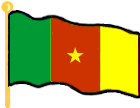Why Duckfowl Coca Chop Tumbu
Nyango wrote: "This one was a hit in our home! You could hear my mother and all her eight children singing with full voice in the kitchen as the evening meal cooked :-) "
Why Duckfowl Coca Chop Tumbu
Why Did the Duck Named Coca Eat Maggots?
Call and Response Song
Call and Response Song
(Cameroonian Pidgin English)
(English)
Lead:
Why duckfowl Coca chop tumbu
All:
Why duckfowl Coca chop tumbu
Duckfowl Coca chop tumbu
Duckfowl Coca chop tumbu
For Ku-u-umba to-o-own for lay?
Why duckfowl Coca chop tumbu
Duckfowl Coca chop tumbu
Duckfowl Coca chop tumbu
For Kumba town for lay?
For Kumba town for lay?
For K-u-umba town for lay.
Lead:
Why you go marry Paulina?
One enthusiastic participant:
That's the question!
All:
Why you go marry Paulina
You go marry Paulina
You go marry Paulina
For Ku-u-umba to-o-own for lay?
Why you go marry Paulina
You go marry Paulina
You go marry Paulina
For Ku-u-umba town for lay?
For Kumba town for lay?
For K-u-umba town for lay.
Lead:
Why did duck Coca eat maggots?
All:
Why did duck Coca eat maggots
Duck Coca eat maggots
Duck Coca eat maggots
For Ku-u-umba to-o-own for lay?
Why did duck Coca eat maggots
Duck Coca eat maggots
Duck Coca eat maggots
For Kumba town for lay?
For Kumba town for lay?
For K-u-umba town for lay.
Lead:
Why did you marry Paulina?
One enthusiastic participant:
That's the question!
All:
Why did you marry Paulina?
You married Paulina.
You married Paulina.
For Ku-u-umba to-o-own for lay?
Why did you marry Paulina?
You married Paulina.
You married Paulina.
For Ku-u-umba town for lay?
For Kumba town for lay?
For K-u-umba town for lay.
Notes
Duckfowl - duck
Tumbu - grub, maggot
Kumba - one of our popular towns in the South West Province of Cameroon
Chop - eat
When I asked Nyango about the meaning of this song, she wrote: "Okay. 'For lay' is a word whose meaning is undetermined. It was probably popular slang at some time but lost its meaning - or a word from some other unidentified Cameroonian language. 'Kumba Town' is a popular town in Cameroon also fondly called 'K-Town'.
'Duck fowl' is Pidgin English for "duck". 'Duck Fowl Coca' = my best guess is that Coca was the name of the duck - as kids we often named the chicken and ducks around our neighborhood. My favorite name was 'Mr. Swallow Rope', one of our cocks that went around clucking madly with a rope he had swallowed hanging out of its beak till we got it out. 'Chop' is Pidgin English for 'eat' and 'tumbu' is actually the 'maggot'. Eating other grub is acceptable for any domestic bird but eating maggots is regarded with disdain hence the reason for the song. Hence, 'Kumba Town for lay' could just be qualifying Kumba as a town where such an 'atrocity' should not happen, as in 'in this our very own Kumba?'."
A little Pidgin English lesson from Nyango: The English section of the second verse should be - "Why did you marry Paulina?" "Go" in Pidgin English is the verb "to go" but also becomes the past or future tense for the verb that follows it. It all depends on the inflection on the word "go". For example - "Why you go talk say..." "Why did you say..." or "why would you say..."or "why you go marry stranger..." = "Why would you marry a stranger?" or "why did you marry a stranger ", etc...

Many thanks to Nyango M. Nambangi of the Minnesota African Women's Association for contributing this song and for such interesting commentary and for singing this song for us!
























